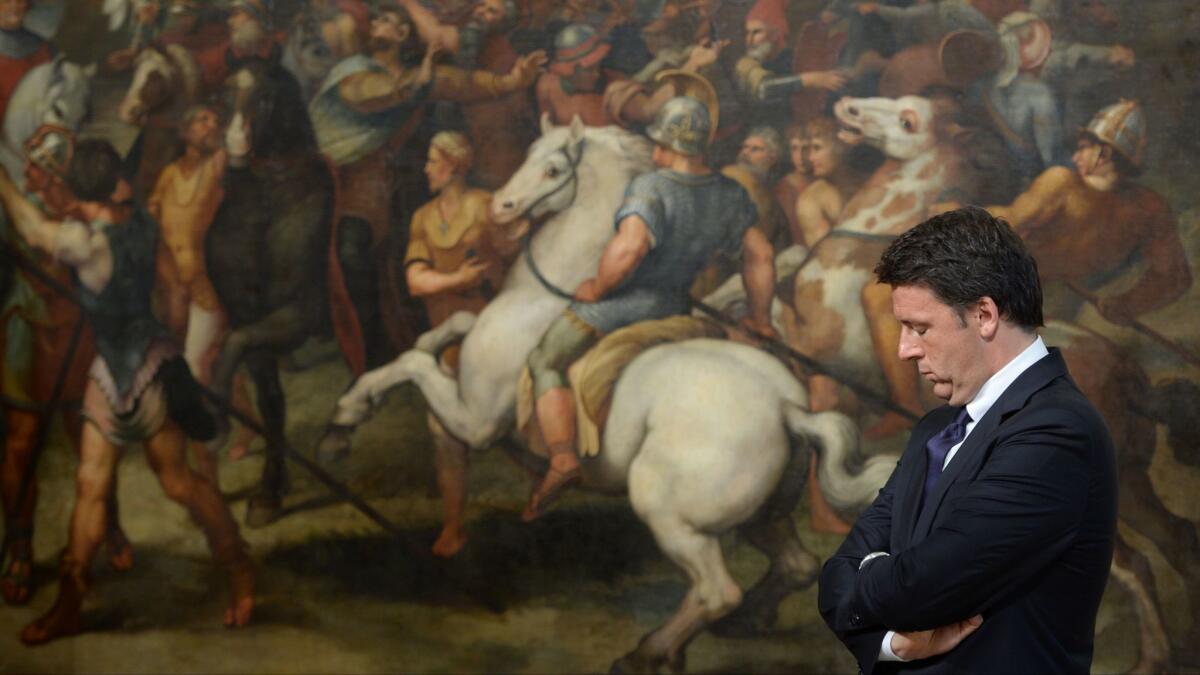Italy hears echoes of Trump and Brexit as anti-establishment parties press their cause

- Share via
Reporting from ROME — Anti-establishment parties are feeling emboldened after the defeat of Italian Prime Minister Matteo Renzi in a crucial referendum, demanding snap parliamentary elections in the wake of his resignation.
The Five Star Movement, which wants Italy to drop the euro currency, and the anti-migrant Northern League party, both called for elections Monday, the day after Italian voters resoundingly snubbed Renzi’s proposals, 59% to 41%.
By promising to step down if he lost the referendum, which would have slashed the senate’s powers, Renzi inadvertently turned the contest into a vote on his government and its handling of Italy’s flatlining economy.
On Monday, the youthful prime minister made good on his promise and handed in his resignation to Italian President Sergio Mattarella, although Mattarella asked him to stay in office until the end of the week to usher through Italy’s 2017 budget.
Calling on his blog for immediate elections, Five Star founder Beppe Grillo wrote, “From next week, we will start to vote for our government policies on-line and for our government team.”
He added, “The regime’s propaganda and all its lies are the first victims of this referendum. The times have changed — sovereignty belongs to the people.”
The Five Star Movement and the Northern League have been likened to the anti-establishment vote which helped push Britain out of the European Union in a referendum held earlier this year, and also have been compared to backers of President-elect Donald Trump.
Much the same was said of the populist, right-wing candidate for president of Austria, Norbert Hofer, but he lost an election Sunday to a leftist candidate, Alexander Van der Bellen, who was the preferred choice of the country’s establishment.
Grillo has distanced himself from hard right anti-establishment parties in Europe, claiming his Five Star Movement is more interested in ecology and online democracy than xenophobia and nationalism.
Mattarella is likely to resist calls for an election, and instead nominate a caretaker government to first pass a new electoral law because the current one only applies to the lower house. It was framed on the assumption that elections to the Italian senate would be annulled by the referendum.
He may nominate as caretaker prime minister a member of Renzi’s Democratic Party, such as Finance Minister Pier Carlo Padoan, since the party remains the largest group in parliament.
Alternatively, he may bring in a nonpolitical government of experts, possibly run by Senate Speaker Pietro Grasso, before fresh elections in 2017 or 2018.
As voting patterns in the referendum were published on Monday, it emerged that a surprisingly large group of No voters, 54%, told exit pollsters they rejected the reforms purely on merit, rather than considering themselves anti-establishment voters.
According to this group, which included former Prime Minister Mario Monti, the reforms hobbled the checks and balances enshrined in Italy’s 1948 constitution by reducing the voting rights of senators in parliament’s upper house.
But one expert said anti-system anger was also evident in young voters and voters in the depressed south of the country, including towns like Palermo in Sicily, where the No vote hit 72%.
“Renzi, a 41-year-old reformer, came to be viewed as an icon of the Italian and European establishment by the young after just 2½ years in office,” said Giovanni Orsina, a professor of politics at Rome’s Luiss University.
“They believe politics will not solve their problems and they voted to punish Renzi, rather than find any solutions,” he added. “They thought ‘I have no hope, and no job, who can I take it out on? How about that guy who’s on TV 12 hours a day?’”
Kington is a special correspondent.
ALSO
Arrest of refugee in rape and murder in Germany threatens Merkel’s immigration policy
What Russian President Vladimir Putin hopes to get from a Trump administration
Europol warns of fresh terror threats to Europe
More to Read
Sign up for Essential California
The most important California stories and recommendations in your inbox every morning.
You may occasionally receive promotional content from the Los Angeles Times.










